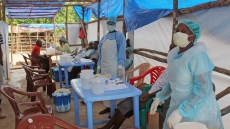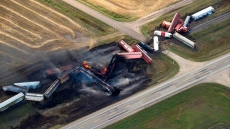VANCOUVER — The British Columbia Law Society will not recognize graduates of a controversial Christian law school.
The society's governing council voted Friday to reverse an earlier decision and uphold the results of a member referendum, rejecting accreditation for law graduates from Trinity Western University.
No one from the society was immediately available to comment.
Students and staff at the private post-secondary facility in the so-called "Bible Belt" in British Columbia's Fraser Valley, must sign a covenant that prohibits sex outside of a marriage that is between a man and a woman.
The proviso has triggered intense debate in legal circles across the country and pitted religious freedoms against same-sex equality rights in Canada.
University spokesman Guy Saffold said officials were disappointed with the law society's decision.
"Putting difficult issues of human rights up to a popular vote, essentially, is not the way these things should be done," Saffold said.
"In Canada we balance these issues in a very thoughtful way, through our courts, and don't vote on issues of minority rights."
Officials have not yet decided whether to pursue legal action in B.C., as they have done in other provinces.
"We'd certainly like to find a way to resolve it apart from legal process ... but it's not been possible so far," Saffold said.
"We're quite committed, as a Christian university, to our religious beliefs and those are not things we could easily compromise."
The university went through a similar tumult in 2001, when it opened a school of education. That issue ultimately ended up before the Supreme Court of Canada, which ruled in 2001 in favour of Trinity Western over the B.C. College of Teachers.
The law school is "essentially the same issue," Saffold said.
"There was a strong feeling by many that the university was behaving inappropriately but the Supreme Court did not see it that way when it was put to a very careful legal test."
The Law Society of Canada has approved Trinity's program and the B.C. Civil Liberties Association has come out in favour of accreditation.
Alberta and Saskatchewan's bar associations have approved accreditation. Manitoba and Saskatchewan have put decisions on hold.
Law societies in Ontario and Nova Scotia voted against accrediting students, prompting Trinity Western to turn to the courts in both provinces.
Judicial reviews of the Nova Scotia and Ontario decisions are scheduled, separately, in Ontario Superior Court and Nova Scotia Supreme Court in December.
In April, the governing council of the B.C. Law Society decided to accredit the law school but members voted against it in a non-binding vote in June.
The governors then announced the mail-in referendum at the end of September. More than 73 per cent of the members who voted did so against accreditation.
On Friday, 25 of 30 "benchers" voted in favour of upholding the referendum result. One was opposed and four members abstained.
The law school at Trinity Western is slated to open in 2016.





